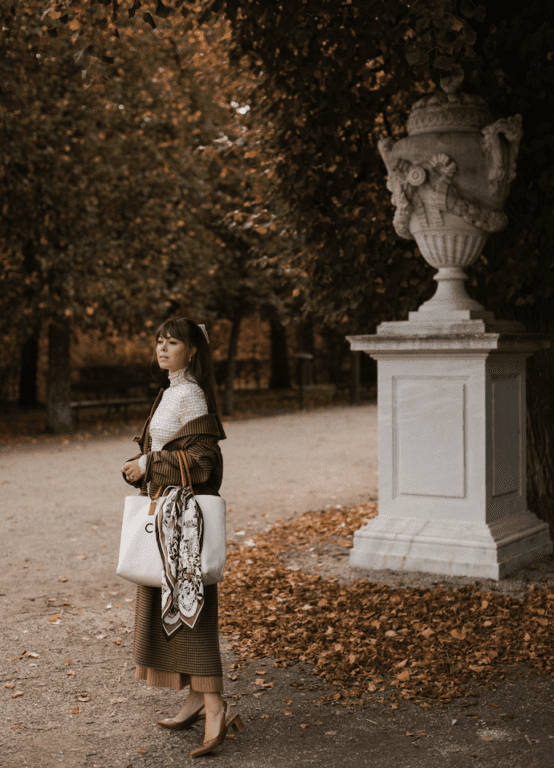What if we reacted to the climate crisis as we have to Covid-19? What would adopting a “flattening the curve” theory look like for humanity?

Through the years, I’ve had an ever-evolving dialogue with each of you as my audience. For the past week, I’ve felt incredibly isolated in my thoughts, and it was only until yesterday I could articulate where I’ve been mentally and felt it was appropriate to share. I am incredibly comforted by each of you in my community who share support and stories of your own.
Be it the current state of the world battling a common invisible enemy; Covid-19. Or perhaps it’s that I’m becoming a mother for the first time and am thinking of what kind of world my daughter will grow up in. Or maybe it’s day eight of quarantine and going on nine months of sobriety. Whatever it is, I’ve felt an innate responsibility to have a dialogue surrounding an issue that’s incredibly important to me because I care deeply about the well being of each of you, your families and our mother earth.
I read an article written by an Italian journalist printed in The Boston Globe. Its focus is on “what Italy could have done sooner that the US should do; self-quarantine for the sake of those at risk before hospitals become overrun and doctors have to choose whom to treat and who not to – like war times.”
This quote really stuck with me;
“We didn’t see the need to change our routines for a threat we could not see.”
Read that again.
“A threat we could not see.”
President Emmanuel Macron of France told his people. “The enemy is invisible and insidious, gathering strength from the bonds of human connection.”

We are unfortunately experiencing first hand what the world will look like if we continue to neglect or ignore threats we can not see, like the Climate Crisis. Arctic sea ice extent is diminishing, sea surface temperatures are increasing, glaciers are melting, the weather is becoming more extreme, and natural habitats like coral reefs and forests are disappearing – making them inhabitable for those species that once called these places home — eventually leading to extinction. This is just the tip of the iceberg when talking about the critical impact global warming is having on our planet.
It’s not a goal of mine to push agendas on anyone; however, it’s my duty as a human being with a platform and a voice to discuss topics that affect us all. We “can’t continue to ignore a threat we can not see” because it’s not convenient for us. Both are issues we can not ignore, and as we currently sit in confines of our homes, I implore you to think about how you will enact change in your life so we can see this beautiful planet thrive for many, many generations to come.
If there’s one lesson we should learn through this pandemic, it’s that selfishness and living only for yourself (not considering how your actions affect others), significantly impacts humanity as a whole. And in our current situation, risks the lives of those who are more prone to dying from Covid-19.
Covid-19 and global warming are similar humanitarian issues in this way – they will only begin to heal when we all start living a little more selflessly. Let me explain; With pandemics, some people are more prone to diseases than others. Does that mean we can all get sick and die? No. But it does mean that the rest of us need to react in a way that protects those who are more at risk. Similarly, Global Warming feels like a kind of pandemic; it’s a virus that’s happening to our world – viruses are fought with a fever.
However, because global warming can’t be seen to some or because it may not be directly affecting us personally, a large number of people choose not to believe its signs and go on living in a way that contributes to an unseen global emergency. We’re blatantly choosing to live selfishly for ourselves now in the moment instead of protecting those it will affect and future generation to come – just like the Covid-19 virus.

Now more than ever, it’s essential to acknowledge that we are all born on this earth as one race – human. We are far more dependent on one another for our existence than we like to acknowledge – the spread of Covid-19 has proven this. However, for some reason, we have not been programmed to think this way.
In the modern world, the ultimate sign of success is measured by how busy we are. Humans are driven by consumption and greed. Our internal mindset is animalistic – to kill or be killed. We’re taught to compete, not complement. We’re taught to fend ourselves, not others. We’ve been living at a hectic pace we can not keep up with. We’ve been this way since the industrial revolution, which altered the reality of life as we knew it; work to live, not live to work.
If there’s one thing I’ve learned from watching the news and reading everything I possibly can, it’s that the most immediate threat of Covid-19 is that the hospital systems will become overwhelmed. Therefore the most pressing issue is to avoid too many people getting sick at the same time because resources are limited. It’s what’s being referred to as “flattening the curve.” It’s why self guaranteeing is so incredibly important at this time, and it’s how China and South Korea have begun to heal.
So the biggest question I see needing to be considered here is; how can we flatten the curve of global warming? If we continue on the trajectory that we’re currently on, we will have many significant Global issues all at once, and many will die. In what ways can we act to offset global warming?

To flatten the curve of Covid-19, most of us are currently practicing the act of social distancing and self quarantining to stop the spread. It’s an extreme measure that’s completely altered life as we know it and will have a far more significant impact on us for years to come. Experts warn that a global recession is coming with a magnitude that we haven’t seen since the great depression. Schools, sports leagues, borders, and businesses are closing – some will never reopen. Millions of people are currently without jobs. The government is already having to consider bailouts and grants, but who will that affect and how quickly can they get much-needed money into the hands of Americans who live paycheck to pay-check to put food on their tables and to keep a roof over their families heads? What keeps me up at night is how this will affect the communities of third world countries who have no access to health care. The situation is dyer.
I think we’re all appreciating now that this drastic measure of self quarantining for a few weeks (while necessary) could have been avoided earlier if we reacted at a time when it mattered most. If you think quarantining for two weeks is hard, the effects that global warming may have could force us into quarantine for months, or worse. Now is the time that matters most for global warming, we need to react now before drastic measures are necessary for human survival – as they are now.
Instead of our hospitals being overcrowded and having to operate on limited resources, first cities, and then countries will begin to feel the impacts of global warming. Cities that used to only see one hurricane a season are now experiencing them with a force that takes decades to recover from – like hurricane Sandy, Katrina and Maria. Just this year, the entire continent of Australia burned for 79 days. 14 million acres of land have been burnt, that’s larger than Denmark and The Netherlands combined. Millions of humans and animals have been displaced, lives forever changed.
Suddenly and without warning, we’ve been forced back into our homes, allowing ourselves a moment of contemplation and reflection. The effects that this moment of solitude is having on humanity and the planet earth is one that echoes our postmodern world.
With people in their homes due to Covid-19, there are fewer people in cars, on planes, trains, taxies, boats, and industrial activities have slowed in producing the amount of pollution that’s aiding in Global Warming. New satellite images over China and Italy show a decline in nitrogen dioxide emissions. Stanford University’s environmental resource Economist, Marshall Burke, found that just two months of pollution reduction may even save more lives than the death rate of Covid-19. With just two months of pollution reduction, Burke’s calculations have shown that the drop in pollution has saved the lives of 4,000 children under 5 and 73,000 adults over 70 in China. That’s significantly more than the current global death toll from the virus itself.
Have you seen the photos of Venice Italy? The water is clear. Clearer than it’s been in 60 years, you can actually see to the bottom.

Being in our homes has forced us to slow down, to think about how we consume, how we’re entertained. But we must ask ourselves now, how we act once the quarantine has been lifted. All of these “necessities”; gyms, spas, travel, have suddenly become luxuries. It’s back to basics. Reading, writing, creating, checking in with friends and family. It’s my hope that this new norm propels us to be satisfied with less and allows us to reset our values and wake up to another global crisis we are facing – global warming.
Indeed, self-quarantine is not the answer when it comes to solutions surrounding the climate. But there is a lesson of preparedness that applies to the climate crisis before such drastic measures, such as the one we’re facing with Covid-19, need to be implemented.
The question here is; what are a few actions we can implement each day that will flatten the curve of our contribution to global warming and ocean pollution? What are some things we can do to reduce our carbon footprint?
Donna Green, associate professor at University of New South Wales’ Climate Change Research Centre, said, “It’s absolutely possible to completely transform our country and world economies in a way that’s sustainable, in a way that would mitigate the risk,”
WHAT YOU CAN DO;
Undoubtedly the task at hand seems daunting, where do we start? Even writing this, I wonder if my small daily efforts even help. But the fact of the matter is that they do contribute to a greater effort, and if we’re all making an effort then it will make a more significant impact. Here are 10 things I’ve committed to on both a larger and smaller scale;
- Get involved in local climate action groups in your area. Being apart of these will help to keep you in the loop with what’s happening in your community. I’ve joined the email list for my local “Make it Green” committee, so I am in the loop on town meetings, petitions, and what my cities action plan is.
- Vote! Policies are the only thing that are going to protect our environment. Want to see where the 2020 presidential candidates stand on climate change? Visit Green Peace for a quick brief.
- We’ve stopped using plastic bags and bottles entirely. We go to the grocery store with bags of our own.
- We’ve adopted and applied the 5 R’s; refuse, reduce, rot, recycle. Please look closely at packaging for details on what can be recycled and what can not. Many cities are different. And in your free time, watch Broken on Netflix. This episode focuses on Recycling.
- We bike or, more recently, walk, instead of taking a car if we can. Meaning, prioritize your schedule to allows for a 30-minute walk to get somewhere.
- We eat seasonally and shop from our local farmers market instead of ordering take out every night. Most importantly, we meal plan so that we are not wasting food. I make a list of the meals we will cook that week and eat leftovers for lunch. For the two of us, 3 cooked meals a week keeps us fed and produces the least amount of waste.
- We’ve also carefully considered the composition of our diets. While we mostly eat a clean vegetarian diet, Freddie and I still eat chicken and fish but save red meat for a bi-monthly treat. Methane emissions caused by cows will be greatly reduced when the demand for meat lowers.
- In our home, there is never a light on when we’re not in that room and heat is only used when absolutely necessary.
- As a blogger, I receive gifts which produces a lot of waste with packaging. I also have to send out a lot of shipments, so I am careful to save my boxes and reuse them.
- When it comes to clothing, the rate at which I go through outfits to product content produces a lot of excesses. I always look to borrow items from designers as a loan instead of purchasing. I am also a huge proponent of renting; Bag Borrow & Steal, Rent The Runway, Bloomingdales, LeTote, Nuuly and Urban Outfitters all offer rental services. Anything I do purchase and do not wear for over a year is donated to women’s shelters or Glam4Good.
The climate crisis is going to require a complete rethinking for our way of life as we know it and for many industries – these are just a few things we can do to start because the world really isn’t set up yet in a way that supports a climate first approach – the way we consume will force retailers and governments to reassess their approach and we are seeing this first hand with how the landscape of retail is changing. What other ways can we enact change? Please share your thoughts with me!
Quick thinking on the part of world leaders around the globe has been put to the test in order to combat a rapidly spreading disease. For years, leading scientists have been warning of the looming threats of Global Warming that will have the same effects of economic disruption, reduced food security, and deaths from natural disasters and limited health resources.
The difference between Covid-19 and the Climate Crisis is that we have the opportunity to enact change that will have a long term effect. We have a chance to start now. Just imagine what humanity is capable of if only the world reacted to global warming the same way is reacting to Covid 19.
When it comes to lives lost, there is no silver lining. But when faced with great adversity, we must be adaptable and learn to implement deep-rooted change. This global pandemic has allowed us to assess many aspects of our lives that are absolutely necessary and what changes can be made that will have lasting effects for humanity and the environment
The earth is all we have. May we all lean into the good that still remains and strengthen through vulnerability as one collective whole.
For facts and information surrounding Covid-19, visit WHO.org.









